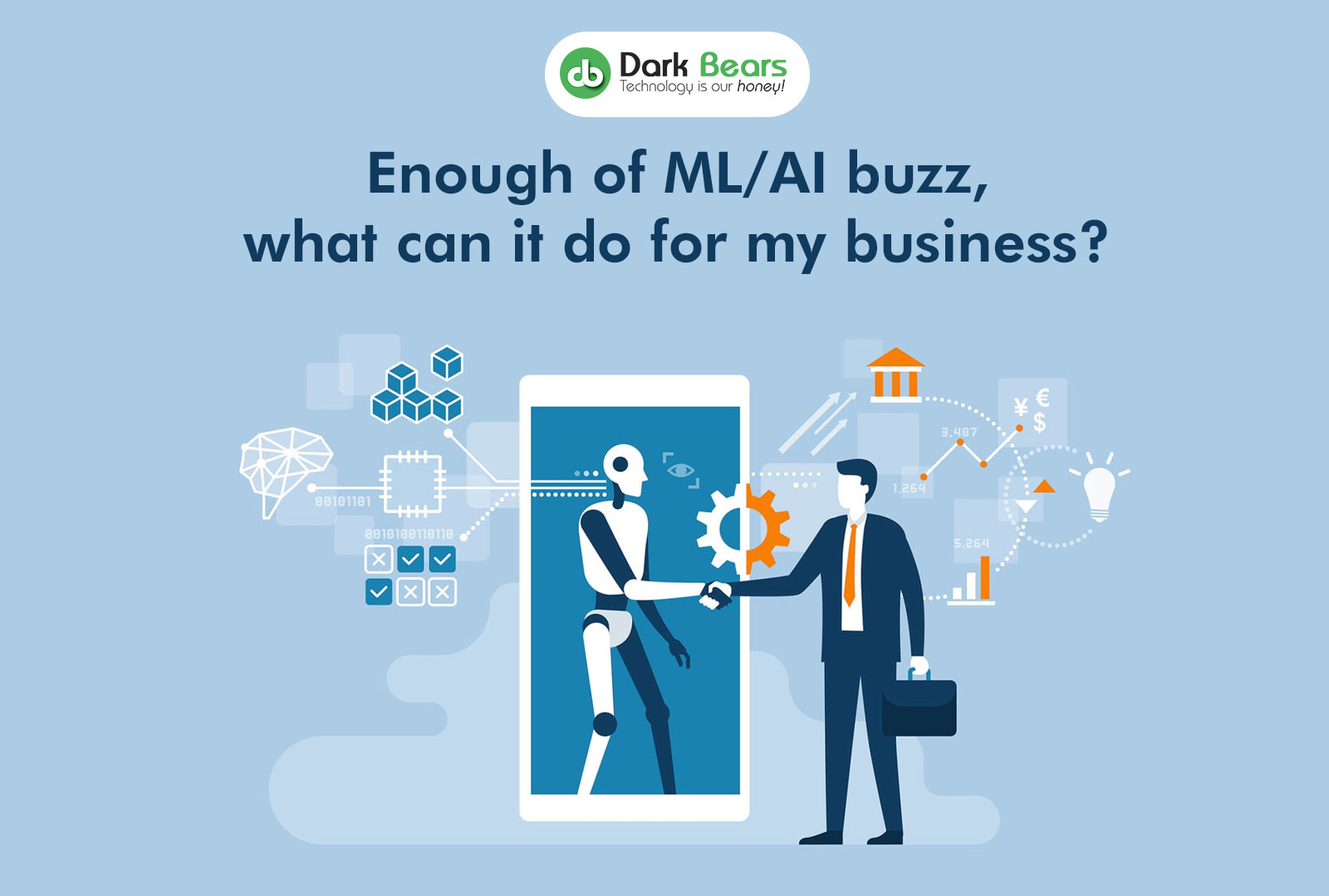admin / April 28, 2022

That’s the funding the Global AI/ML start-up ecosystem received in 2021. This massive elevation is being fuelled by the quest of the companies to help businesses with automation, Artificial Intelligence, Machine Learning, and others.
This signifies that the AI/ML buzz–which started in 2012, has grown loud enough to penetrate businesses around the world, and for a good reason. Yet a painful fact persists–What can be the potential benefit of assimilating AI/ML in my business?
Picture this:
Your AI-driven marketing software provides actionable intelligence on writing content that boosts your conversion rates.
Your employees are no longer engaged in the tedious tasks of summarizing articles and meeting discussions as all that is done using Grammar correction and Summarization AI tools.
You get a daily automatic update on what your customers talk about your business on your social handles.
This is very little that ML/AI can do!
Today, AI/ML systems are not limited to marketing or increasing productivity, but it offers invaluable insights into market trends through Sentiment Analysis, building tech-driven interactions through Brand Imaging, and redefining the complete ecosystem for businesses.
No wonder why the global AI/ML market size is expected to reach $169,411.8 million by 2025.
That all sounds great but is on an abstract side of things. So let’s take a look at the benefits of AI/ML for your business.
Talk about AI/ML, and everyone assumes you’re thinking about how to use machines to replace humans. But the real power of AI lies in its ability to accelerate revenue growth for your business. The AI-backed systems boost revenue by speeding up deliveries, increasing output, and providing demand forecasts.
AI adopters report 5-6 percentage points of increase in their revenue from their investments. The more mature a company’s level of AI adoption, the higher that revenue surge.
Source: IBM Institute of Business Value
This recent survey by IBM revolving around the adoption of AI in the global industries provides even stronger evidence of a direct positive relationship between business performance and AI adoption.
Digital innovation and revenue growth amplify the need for AI to be an ally in strategic decisions. Through AI systems of constantly ingesting data and delivering strategic forecasts, you can assess the responses of all stakeholders. Also, for better decisions after a meeting, the AI assistant for meeting Summarization summarizes the crucial points that form a base for effective decisions.
This will help mitigate disruptions and seize new opportunities. Therefore, the payoff is huge and far outweighs the investment made for AI adoption.
Source: PwC 2021 AI Predictions
Companies are using AI in various aspects of talent management, from streamlining the hiring process to rooting out the bias in corporate communications.
These AI-enabled processes skyrocket productivity by successfully sourcing, screening, and identifying top-tier candidates. Additionally, using AI’s Sentiment analysis efficiently gauges the employees’ sentiments, identifying and retaining the high performers and determining equitable pay.
By now, you can figure out that AI/ML can become an indispensable part of your business. And while it can be a relatively new concept for you, here are six practical implementations of AI/ML for your business.
Technology infiltration into our lives is on the rise. With that, customers are constantly sharing their opinion about brands on social media, online reviews, and customer support interactions. This directly contributes to how the end-users perceive your brand, what are the shortcomings faced by them, and the innate opportunities for improvement in your product/service.
To keep track of this invaluable information, you need to turn to sentiment analysis using AI, which automatically identifies the emotional tone of your customers through the comments and gains fast, real-time insights from a large pool of customer data.
Through sentiment analysis using AI, you can:
The primary objective of companies adopting AI/ML for their business is to enhance the brand experience. Through Brand Imaging using AI, your company can improve the customer journey, content performance, personalization, and improve the credibility of your brand.
Brand imaging using AI can upgrade your brand accessibility, create brand assets, build brand authenticity and create a strong buyer persona for your brand. This removes the barrier between a customer and a brand and accentuates the brand’s humanity benefits through a bit of automation.
Manual grammar correction and summarization can be a laborious task, especially when there is an explosion in the amount of data written from different sources. But, with grammar correction and summarization using AI, we can remarkably produce concise and fluent summaries while preserving the key element of the content and its overall meaning. It also facilitates grammar revisions as all the grammar rules, and technicalities of the language have been added to the system.
For achieving the summary and grammatically correct content, the AI/ML systems have been trained to comprehend the documents, identify the sections with key information, run the grammar-check tool, and then extract a summary devoid of any grammatical mistakes. Therefore, it is an extremely feasible option for companies who want to automate their content department and increase the efficiency of their writers.
The rise in remote meetings due to the pandemic has become a new normal in the corporate setup. While it is practically impossible to remember every point discussed throughout the meeting, sometimes an important point might slip off your mind due to lack of attention. And going through the whole recording means hours wasted to find that one particular point.
A solution to this is an AI assistant for meeting summarization. This feature gives you an idea about what your team discussed during the meeting without listening to the recording or reading the entire transcript. The meeting summaries will be mentioned, inclusive of action items, key points, and decisions. The AI assistant for meeting summarization is designed to remove all the hassles involved in a meeting so that your employees can make the most of it.
Voice has been a customer’s most preferred medium for communicating with the company, and it continues to be on. Customers feel at ease when they hear a human voice interacting with them while interacting with a company. To capitalize on this, Interactive Voice Response(IVR) systems have been formed.
IVR formation with AI has two different ways to input information:
1. Using the keypad, or 2. Speaking to the phone using Automatic Speech Recognition(ASR). IVR makes it easier for the application to decipher natural speech input.
This means that the customer can be provided with topmost customer service 24×7 enhancing the company’s credibility and integrity.
Practical implementation of AI/ML will revolutionize the working of your business, but it is on the hand-wavy side of things. So, let’s look at the penetration of AI in different industries with the actual stats and practical use cases as to how AI/ML embedded processes are transforming the industries today.
Source: Deloitte: the State of AI in 6 different industries across 9 continents.
Machine learning is incessantly being utilized in the Telecommunication industry to gain consumer insights, enhance customer experience, and optimize 5G network performance.
According to Grand View Research, the global artificial intelligence in telecommunication is expected to grow at a compound annual growth rate(CAGR) of 38.4% from 2020 to 2027. The market will be segmented into network optimization, customer analytics, virtual assistance, network security, and others based on application.
AI/ML is touted as one of the most path-breaking developments resulting in varied economic and societal benefits that will improve risk pooling and enhance risk reduction, prevention, and mitigation.
For instance, Robotic Process Automation(RPA) is being formed to carry out monotonous and repetitive tasks so that the operational department can focus on more complex actions. Additionally, the ardent task of dealing with thousands of claims and customer queries has been kept off-guard through the Machine Learning embedded system. It drastically improves the claims processes value chain and determines claim fraud detection and claim adjudication.
Financial services are using AI/ML tools to modernize their offerings, including personalized customer services, better detection of fraud and money laundering, and improving risk analysis.
AI/ML are instrumental to these developments because they work by extracting meaningful insights from raw data sets, solving complex data-rich problems, and providing accurate results. Right from speeding up the underwriting process, model validation, portfolio optimization, Robo-advising, and market impact analysis, to offering alternative credit reporting methods, the use cases of AI/ML have a significant impact on the financial sector.
While there is a great deal of hype around the assimilation of AI/ML systems for improving your business activities, the benefits achieved through the investment in these systems far outweigh their cost. At the outset, it may seem a bit overwhelming, but the good news is, once you gauge its value-based capacity, all of the apprehensions will vanish away.
The best way to do this is to ascertain the time-consuming yet crucial tasks and build a system around them using AI/ML tools. This will boost the productivity of the employees and reduce the turn-around time, thereby broadening the arena of employees’ crucial task-focused work and increasing the revenue of your business.




